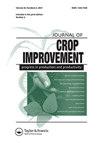Analytical performance and “receiver operating characteristic curve” analysis of resazurin assay for seed-viability estimation in flax
IF 1.5
Q3 AGRONOMY
引用次数: 0
Abstract
ABSTRACT Germination capacity is an important parameter of seed viability. The direct germination test destroys the seed. Viability evaluation by nondestructive tests allows the saving of seeds for storage and future use. However, predictive values of most nondestructive tests have not been adequately determined. This study investigated performance parameters and optimized assay conditions for a nondestructive colorimetric resazurin seed-viability test of flax seeds (Linum usitatissimum L.). In this study, 800 seeds were tested by resazurin test before germination. Optimization of resazurin test conditions and cutoff value was determined via a “receiver operating characteristic curve” analysis. We found that the optimal incubation time was 2 h. We proposed to measure sample absorption at 595 nm for better seed-viability estimation by resazurin test due to spectral properties of dye. We improved sensitivity of the resazurin test by using measurements adjusted to blank absorption at 595 nm (sensitivity 91%) or to sample absorption at 490 nm (sensitivity 95% versus 81% before corrections). The resazurin test reliably predicted germinable seeds in 72–73% cases and ungerminable seeds in 92–95% cases, with a sensitivity of 91–95% and a specificity of 71–74%. Therefore, the easy and low-cost resazurin test exhibited analytical performance similar to more expensive instrumental tests and can be suitable for nondestructive seed-viability estimation.reazurin法测定亚麻种子活力的分析性能及“接收者工作特性曲线”分析
发芽能力是种子活力的一个重要参数。直接发芽试验会破坏种子。通过无损检测进行可行性评估,可以保存种子以备储存和未来使用。然而,大多数无损检测的预测值尚未得到充分确定。本研究对亚麻种子(Linum usitatissimum L.)进行了非破坏性比色重氮菌素种子活力测试,研究了其性能参数和最佳测试条件。通过“受试者工作特性曲线”分析确定了雷沙祖林测试条件和截止值的优化。我们发现最佳孵育时间为2小时。由于染料的光谱特性,我们建议通过雷沙祖林试验测量595nm处的样品吸收,以更好地估计种子活力。我们通过使用调整为595 nm空白吸收(灵敏度91%)或490 nm样品吸收(校正前灵敏度95%对81%)的测量值,提高了雷沙祖林测试的灵敏度。雷萨祖林试验可靠地预测了72–73%的可发芽种子和92–95%的不可发芽种子,敏感性为91–95%,特异性为71–74%。因此,简单且低成本的雷沙苏林测试表现出类似于更昂贵的仪器测试的分析性能,并且可以适用于无损种子活力估计。
本文章由计算机程序翻译,如有差异,请以英文原文为准。
求助全文
约1分钟内获得全文
求助全文
来源期刊

Journal of Crop Improvement
Multiple-
CiteScore
3.30
自引率
7.70%
发文量
42
期刊介绍:
Journal of Crop Science and Biotechnology (JCSB) is a peer-reviewed international journal published four times a year. JCSB publishes novel and advanced original research articles on topics related to the production science of field crops and resource plants, including cropping systems, sustainable agriculture, environmental change, post-harvest management, biodiversity, crop improvement, and recent advances in physiology and molecular biology. Also covered are related subjects in a wide range of sciences such as the ecological and physiological aspects of crop production and genetic, breeding, and biotechnological approaches for crop improvement.
 求助内容:
求助内容: 应助结果提醒方式:
应助结果提醒方式:


